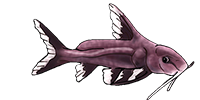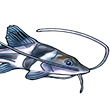Help in Cory selection for my 55 gallon ...
-
Itchycatfish
- Posts: 4
- Joined: 13 Nov 2003, 04:07
- Location 1: Kentucky
- Contact:
Help in Cory selection for my 55 gallon ...
Hey, this is my first post but I've been visiting the site for a while now. Anyways, in my 55 gallon tank I'm keeping 3 assorted rainbowfish, a 7" pleco that has stopped growing, one small bumblebee catfish, and 8 aeneus/bronze corycats. It's filtered by two Whisper 3 power filters and gets a weekly 20% waterchange every monday. I watch the corys even more than my Boeseman rainbows and have decided to buy some different species. My pH is about 7 - 7.2 usually and the temperature stays around 76 - 78 degrees Farenheit. My question is: What are some interesting cory species that I could house with my aenesuses (that just sounds wrong) that keep about the same water requirements, are decently hardy, and have the best coloration. At first I wanted Adolfoi but their pH requirement seems too high, then I wanted Similis but I'm not sure if they keep their "pretty" coloration all the time. I'm talking specifically about the picture under profiles of the male and the female with the Day-Glo purples and pinks. Not all of the Similis photos I've seen have that same bright coloration. I don't really care about price as long as the species is colorful and hardy. I've also read that it's better to buy tank-bred fish versus wild-caught because they're usually hardier. Is there any truth in that? Another side question: I've checked on some fish ordering websites and am clueless as to the F0, F1, etc. terminology. Could someone please clarify? Also are there any recommended places to shop online? I know this is a lot of questions so I apologize in advance. Help me ...
- Silurus
- Posts: 12454
- Joined: 31 Dec 2002, 11:35
- I've donated: $12.00!
- My articles: 55
- My images: 896
- My catfish: 1
- My cats species list: 90 (i:1, k:0)
- Spotted: 428
- Location 1: Singapore
- Location 2: Moderator Emeritus
-
Itchycatfish
- Posts: 4
- Joined: 13 Nov 2003, 04:07
- Location 1: Kentucky
- Contact:
Ahh. .. that makes sense.
Thanks for the reply. Now the invoices make a lot more sense. I wondered why some of the same species cost more. Now can anyone recommend some cory species for me? 
-
Viking Bear
- Posts: 36
- Joined: 05 Nov 2003, 05:43
- Location 1: Chicago, Illinois
- Interests: corydoras and loaches
tank raised are hardy for several reasons.
They are used to living in a tank and are not stressed from the experience.
They usually are not shipped thousand of miles in a little bag. often home breeders sell baby fish to their favorite pet stores.
They are more likiely to be disease and parasite-free.
They are use to eating the food available in tanks
I also think natural selections is a factor Every generation would have fish that survive adverse conditions in the aquarium.
as for pricing
wild fish tend to be cheaping than raising fish.
The number of fish available in the wild.
The ease in which they are transported. If you have a species that only 50% survive shipping the cost will be higher.
They are used to living in a tank and are not stressed from the experience.
They usually are not shipped thousand of miles in a little bag. often home breeders sell baby fish to their favorite pet stores.
They are more likiely to be disease and parasite-free.
They are use to eating the food available in tanks
I also think natural selections is a factor Every generation would have fish that survive adverse conditions in the aquarium.
as for pricing
wild fish tend to be cheaping than raising fish.
The number of fish available in the wild.
The ease in which they are transported. If you have a species that only 50% survive shipping the cost will be higher.
-
Itchycatfish
- Posts: 4
- Joined: 13 Nov 2003, 04:07
- Location 1: Kentucky
- Contact:
So it's been narrowed down to tank-raised ...
Thanks for the info: I guess it makes sense that the fish will be more used to tap water, the confines of a tank environment in general, taking flake/pellet foods and thus be easier to keep. I fought the urge today to just pick up some paleatus corys on the way home from school. I'm still holding back for something more ... vivid and different. I really wish someone [cough: Ian] would post about their experiences with Similis/Adolfoi and their tolerance of a neutral to mid-neutral pH and hard water ... and their intensity of color. I would just feel bad keeping a fish in inappropriate water conditions even if it was beautiful. I wouldn't want them to suffer just for my sake. Or maybe someone could recommend a cory species I've never even heard of that would work good in these conditions? Oh well. I sit in wait 
- spiny
- Posts: 106
- Joined: 10 Nov 2003, 00:29
- Location 1: Oslo,Norway
- Interests: Fish,cacti,orchids,botany,biology,being up in the mountains, out in the forest, or sailing the ocean, etc etc
Hi!
If you want Corydoras for waters around 7 or slightly above, this might be a bit above what most species have in their habitats. But many species are very adaptable.
One thing to think about, is that the central Amazon area generally has rivers/waters containing quite soft water. You can divide them roughly into tree groups: blackwaters, clearwater and whitewater.
Blackwater is very acidic, and you should avoid species from such waters, when having a ph at 7.
Clearwater and especially whitewater often show a higher ph. Whitewater contains more sediments and minerals, and what is interesting is, that the closer you get to the Andes (that huge mountainrange along western south America), the harder the water. This is because of sediments from the weatherworn mountains.
For example the Amazonas (Solimoes) river is a whitewater river, and Rio Negro joining Amazonas at Manaus is black water.
There are some areas in Brazil that have lime-rich ground, and therefor gives the water higher ph values.
The Aqualog book "All Corydoras" show pictures and geographical origin of most species. You will find info about this one at http://www.aqualog.de
I will browse through my book later this weekend, and will give you some proposals later.
Good luck!
Bjorn
If you want Corydoras for waters around 7 or slightly above, this might be a bit above what most species have in their habitats. But many species are very adaptable.
One thing to think about, is that the central Amazon area generally has rivers/waters containing quite soft water. You can divide them roughly into tree groups: blackwaters, clearwater and whitewater.
Blackwater is very acidic, and you should avoid species from such waters, when having a ph at 7.
Clearwater and especially whitewater often show a higher ph. Whitewater contains more sediments and minerals, and what is interesting is, that the closer you get to the Andes (that huge mountainrange along western south America), the harder the water. This is because of sediments from the weatherworn mountains.
For example the Amazonas (Solimoes) river is a whitewater river, and Rio Negro joining Amazonas at Manaus is black water.
There are some areas in Brazil that have lime-rich ground, and therefor gives the water higher ph values.
The Aqualog book "All Corydoras" show pictures and geographical origin of most species. You will find info about this one at http://www.aqualog.de
I will browse through my book later this weekend, and will give you some proposals later.
Good luck!
Bjorn
Bjorn H S
"Oh, uh, this..the moon is in the wrong position!"
Ozzy Osbourne
"Oh, uh, this..the moon is in the wrong position!"
Ozzy Osbourne
- Coryman
- Expert
- Posts: 2119
- Joined: 30 Dec 2002, 19:06
- My articles: 12
- My catfish: 5
- My cats species list: 83 (i:3, k:0)
- My BLogs: 1 (i:0, p:46)
- Spotted: 194
- Location 1: Kidderminster UK
- Location 2: Kidderminster, UK
- Interests: Cory's, Loricariids, photography and more Cory's
- Contact:
Most Cory species are tolerant of quite a range of water conditions and only really need soft or low pH water to incourage and help for breeding. I keep and breed C. burgessi, C. sterbai and C. adolfoi in a pH of 7.4 - 7.4 and a hardnes of 8 - 10 degrees.
If you are looking for colour then here a few to think about, all of then may not show that well when in a shop or straight away when you have then at home, but once established and conditioned they will.
C. sterbai; C. elegans; C. napoensis; C. gossei; C. duplicareus; C. adolfoi; Actually the list is endless and as far as I am concerned they are all beautiful. I think it is more like what is available than what can you have. There are pictures of something like 250 species on my site have a look around and the see what is available in your aera.
Ian
If you are looking for colour then here a few to think about, all of then may not show that well when in a shop or straight away when you have then at home, but once established and conditioned they will.
C. sterbai; C. elegans; C. napoensis; C. gossei; C. duplicareus; C. adolfoi; Actually the list is endless and as far as I am concerned they are all beautiful. I think it is more like what is available than what can you have. There are pictures of something like 250 species on my site have a look around and the see what is available in your aera.
Ian
-
Itchycatfish
- Posts: 4
- Joined: 13 Nov 2003, 04:07
- Location 1: Kentucky
- Contact:
Interesting about the different water types ... hmmm.
Thanks for the links too! Now I'm gonna go CoryShopping for the next few hours.
I think I might special order some rarer type of cory, though just to be different. They sure would make a good Christmas present, eh? Thanks again and anyone else feel free to respond.
Thanks for the links too! Now I'm gonna go CoryShopping for the next few hours.
I think I might special order some rarer type of cory, though just to be different. They sure would make a good Christmas present, eh? Thanks again and anyone else feel free to respond.







